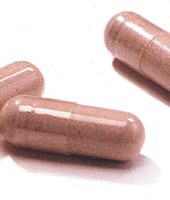Advertisement
Dong Quai
This herb is commonly used in the Orient to regulate menstrual function and tone female organs. Dong quai (Angelica sinensis) is one of the world’s best menopause and peri-menopause herbs. It has been used extensively in China to regulate menses, after childbirth and stopping birth control pills, as a blood tonic and mild sedative, as … Continued

This herb is commonly used in the Orient to regulate menstrual function and tone female organs. Dong quai (Angelica sinensis) is one of the world’s best menopause and peri-menopause herbs. It has been used extensively in China to regulate menses, after childbirth and stopping birth control pills, as a blood tonic and mild sedative, as well as for abdominal pains, angina, chills, hypertension and headaches.
How Does it Work?
Contrary to popular belief, dong quai has no estrogenic effect. It’s completely safe for women going through menopause who have concerns about estrogenic tumours. Dong quai both contracts and relaxes uterine muscles, a dual effect underlying its effectiveness in regulating menstrual complaints. Another mechanism is its ability to enhance body metabolism and oxygen utilization in the liver. As all hormones are ultimately cleared from the body via the liver, this greatly benefits metabolism and endocrine function. Dong quai also protects the liver from toxic materials.
What Evidence Supports its Use?
Dong quai has a clinical history that’s several thousand years old. It was first recorded in Chinese literature in Collection of Commentaries on the Materia Medica in 500 BC. Its tonic action is most seen in its ability to “tone the blood.” This concept from traditional Chinese medicine (TCM) refers to much more than anemia and can include both psychological and physiological issues. “Deficient blood” in the TCM sense has symptoms of low energy, depressed mood, pallid face and lips, dizziness, diminished vision, palpitations, dry skin, menstrual irregularities, a pale tongue and a fine pulse. Dong quai is the most common herb in the Orient used to regulate menstrual function and tone female organs. Dong quai is also believed to increase female sexual desire. It can further be used by males to tone the blood and is very efficient for teenage acne.
This herb has been shown to protect against vitamin E deficiency, reduce heart palpitations, depress tachycardia (rapid heart rate) and prevent coronary atherosclerosis (clogged arteries). Its blood pressure-lowering activity is due to its role in assisting the dilation of blood vessels.
Anti-tumour action of dong quai has been observed in several studies. Dong quai root inhibits many types of bacteria, while its chemical components (polysaccharides) both stimulate and modulate the immune system. A mild sedative, dong quai calms the mind and the smooth muscles in the intestines and bladder. One of the constituents, ligustilide, has shown strong anti-asthmatic activity, as well as anti-spasmodic action in the gastrointestinal tract.
Caveats
This herb is safe when used in the suggested dosage range. It has been consumed for millennia, most often combined with other botanicals. It is also safe to take along with drugs. Side-effects, such as excessive bleeding and occasional fevers, are very rare and disappear when the herb is discontinued.
The Bottom Line
Dong quai has proven itself to be excellent for a wide range of female complaints, as a blood tonic and for several other health problems. It is usually combined with other herbs and can be safely taken with many pharmaceuticals.




